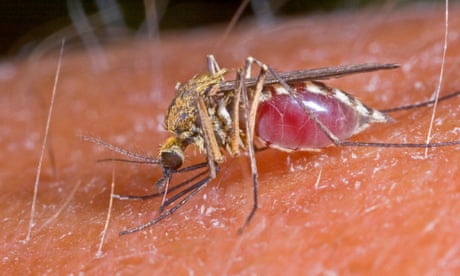nivek
As Above So Below
Plan to release genetically modified mosquitoes in Florida gets go-ahead

Oxitec, a British-based biotechnology company, has targeted the US as a test site for a special version of Aedes aegypti mosquitoes. The mosquitoes contain a protein that, when passed down to female offspring, will kill them and, it is hoped, prevent them from biting people and spreading diseases such as dengue fever and Zika.
On Tuesday, it was announced that the Florida department of agriculture and consumer services has given the green light to a plan to release the millions of mosquitoes in the Florida Keys, the string of picturesque islands that extend from the southern tip of the state, beginning this summer.
Last month, the US Environmental Protection Agency (EPA) also approved the Florida plan, as well as a further trial next year that will take place in Harris county in Texas, which includes Houston.
Proponents of the trial say that as only modified male mosquitoes, which do not bite people, will be released, there will be no danger to the public.
But the plan has caused uproar among conservation groups, which have said they intend to sue the EPA for allegedly failing to ascertain the environmental impact of the scheme. Scientists have also expressed concerns about the oversight of the trial.
On Tuesday, opponents of the plan rallied outside the Florida Keys Mosquito Control District office, which has to deal with more than 40 species of mosquito in the region, to demand its board oppose the trial.
The plan is a “Jurassic Park experiment”, said Jaydee Hanson, policy director for the International Center for Technology Assessment and Center for Food Safety. “What could possibly go wrong? We don’t know, because they unlawfully refused to seriously analyze environmental risks.”
Barry Wray, executive director of the Florida Keys Environmental Coalition added: “People here in Florida do not consent to the genetically engineered mosquitoes or to being human experiments.”
Mosquitoes have long plagued people in the marsh-rich Florida environment. Native Americans used to ward the biters off with smoke or simply bury themselves in the sand to avoid them, while early white settlers slathered themselves in bear fat or burned oily rags. More recently, authorities have conducted mass spraying of mosquito habitat with insecticides that have been linked to the deaths of non-target insects, such as bees.
.
- 750m insects to be released with second trial planned for Texas
- Critics say risks of ‘Jurassic Park experiment’ not assessed

Oxitec, a British-based biotechnology company, has targeted the US as a test site for a special version of Aedes aegypti mosquitoes. The mosquitoes contain a protein that, when passed down to female offspring, will kill them and, it is hoped, prevent them from biting people and spreading diseases such as dengue fever and Zika.
On Tuesday, it was announced that the Florida department of agriculture and consumer services has given the green light to a plan to release the millions of mosquitoes in the Florida Keys, the string of picturesque islands that extend from the southern tip of the state, beginning this summer.
Last month, the US Environmental Protection Agency (EPA) also approved the Florida plan, as well as a further trial next year that will take place in Harris county in Texas, which includes Houston.
Proponents of the trial say that as only modified male mosquitoes, which do not bite people, will be released, there will be no danger to the public.
But the plan has caused uproar among conservation groups, which have said they intend to sue the EPA for allegedly failing to ascertain the environmental impact of the scheme. Scientists have also expressed concerns about the oversight of the trial.
On Tuesday, opponents of the plan rallied outside the Florida Keys Mosquito Control District office, which has to deal with more than 40 species of mosquito in the region, to demand its board oppose the trial.
The plan is a “Jurassic Park experiment”, said Jaydee Hanson, policy director for the International Center for Technology Assessment and Center for Food Safety. “What could possibly go wrong? We don’t know, because they unlawfully refused to seriously analyze environmental risks.”
Barry Wray, executive director of the Florida Keys Environmental Coalition added: “People here in Florida do not consent to the genetically engineered mosquitoes or to being human experiments.”
Mosquitoes have long plagued people in the marsh-rich Florida environment. Native Americans used to ward the biters off with smoke or simply bury themselves in the sand to avoid them, while early white settlers slathered themselves in bear fat or burned oily rags. More recently, authorities have conducted mass spraying of mosquito habitat with insecticides that have been linked to the deaths of non-target insects, such as bees.
.
